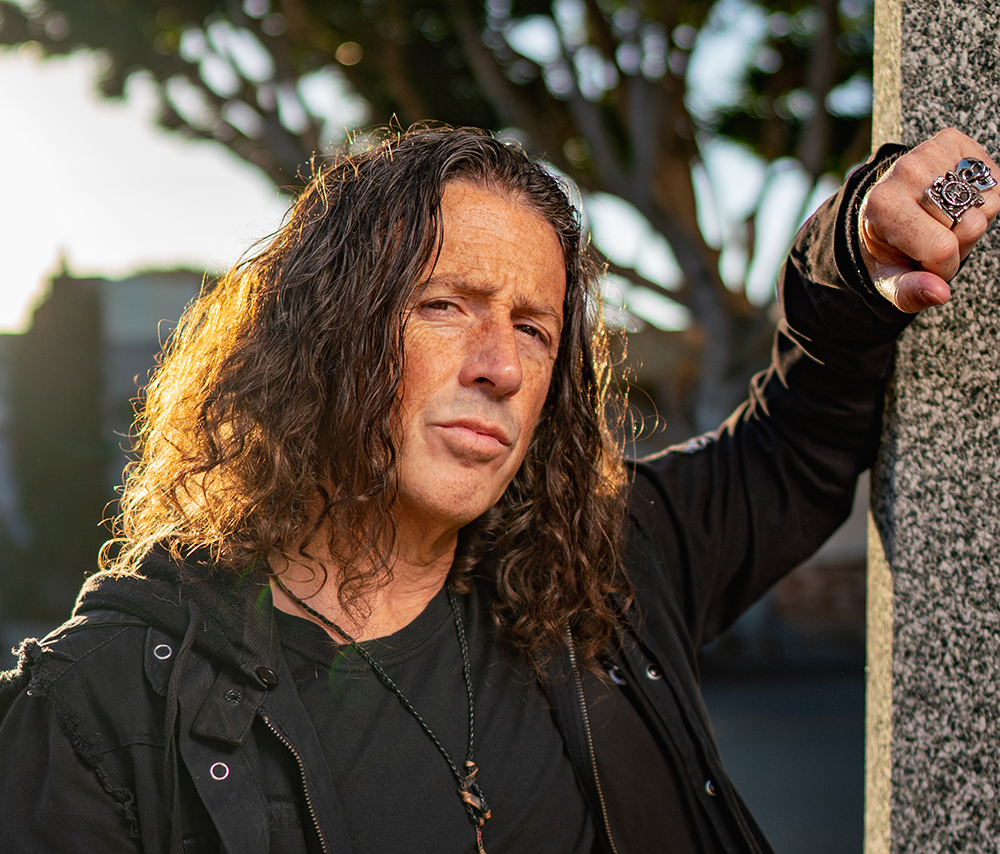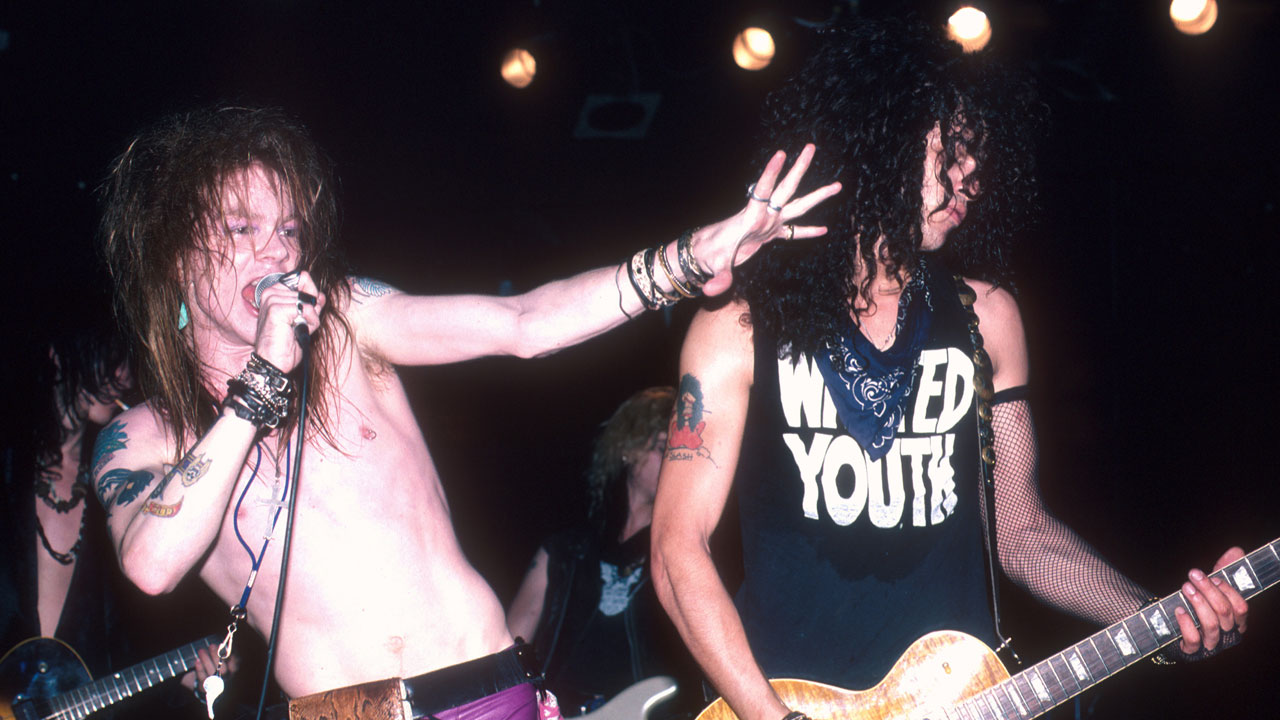"I'm really starting to get the itch. I want to headline arenas" - Rival Sons on the album that should take them to the next level
After six albums in 15 years and touring alongside a raft of A-listers, new album Darkfighter finds Rival Sons ready to take it to the next level
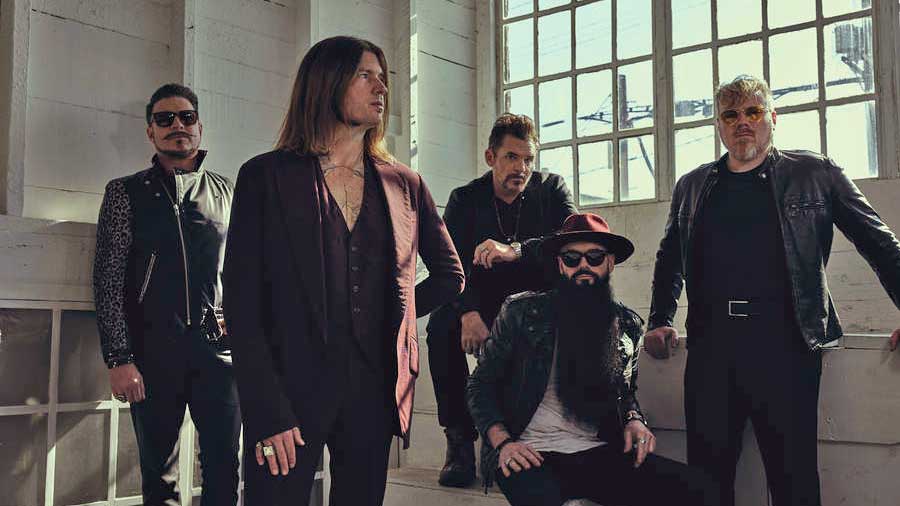
Select the newsletters you’d like to receive. Then, add your email to sign up.
You are now subscribed
Your newsletter sign-up was successful
Want to add more newsletters?

Every Friday
Louder
Louder’s weekly newsletter is jam-packed with the team’s personal highlights from the last seven days, including features, breaking news, reviews and tons of juicy exclusives from the world of alternative music.

Every Friday
Classic Rock
The Classic Rock newsletter is an essential read for the discerning rock fan. Every week we bring you the news, reviews and the very best features and interviews from our extensive archive. Written by rock fans for rock fans.

Every Friday
Metal Hammer
For the last four decades Metal Hammer has been the world’s greatest metal magazine. Created by metalheads for metalheads, ‘Hammer takes you behind the scenes, closer to the action, and nearer to the bands that you love the most.

Every Friday
Prog
The Prog newsletter brings you the very best of Prog Magazine and our website, every Friday. We'll deliver you the very latest news from the Prog universe, informative features and archive material from Prog’s impressive vault.
It’s a balmy evening in Southern California, and the Honda Center – home ice of the National Hockey League’s Anaheim Ducks – has been transformed into a surging, spiritualised rock’n’roll revival, courtesy of Rival Sons and headliners Greta Van Fleet.
The place is nearly full to capacity when Rival Sons pile into their adrenalised, seven-song opening set. As frontman Jay Buchanan introduces Shooting Stars, the 18,000-strong audience lift their phones into the air with flashlights facing the stage, creating a zoomed-in Milky Way galaxy – albeit with clouds of cannabis smoke floating in the middle. For Buchanan, the moment is a time warp.
Sitting down with Classic Rock a few days later, he recalls his pre-Rival Sons days, touring the US with his old band, Buchanan.
“We were just making ends meet,” he says. “I slept in the RV in our manager’s parking lot just three blocks down the street from the Honda Center. I would drive past it and hear about the big shows going on there and I would wonder: ‘When is it going to be my turn?’”

Pulling into the gated entrance of a windowless concrete compound in North Hollywood, we punch a code into a keypad and the creaky steel gate pulls back. We’ve arrived at Rival Sons’ rehearsal studio, where the guys are running through some new material before their year kicks into high gear. This afternoon we’ll be getting the lowdown on Darkfighter, their seventh new album, and Lightbringer, another new album, to be released later this year.
As we enter their spacious rehearsal room, Rival Sons guitarist and co-founder Scott Holiday greets us with a broad smile and a firm handshake and announces that he is positively famished. He proposes that we conduct our chat over dinner at a nearby Mexican restaurant. “Two pineapples, one spear,” he says grinning.
Formed in Long Beach, California in 2008, Rival Sons (singer/guitarist Jay Buchanan, lead guitarist Scott Holiday, drummer Mike Miley and bassist Dave Beste, along with touring keyboard player Todd Ögren) spearheaded the 21st-century classic rock renaissance along with the likes of Wolfmother, Graveyard and The Answer. Fusing the polish and power of modern hard rock with the bluesy swagger of Led Zeppelin and the Rolling Stones, Rival Sons conjured a sound that balanced irresistibly heavy riffs with boogie-friendly grooves and Buchanan’s skyscraping vocals.
Sign up below to get the latest from Classic Rock, plus exclusive special offers, direct to your inbox!
As legions of new bands crowded onto the retro-rock landscape, Rival Sons outpaced the pack by constantly evolving their sound into something distinctly vital, ever recalling rock’s golden age while plotting its future. Critically acclaimed albums such as Pressure & Time, Head Down and Great Western Valkyrie charted a revered trajectory, before 2019’s Feral Roots notched new highs, drawing lusty critical praise, hordes of new fans and two Grammy nominations.
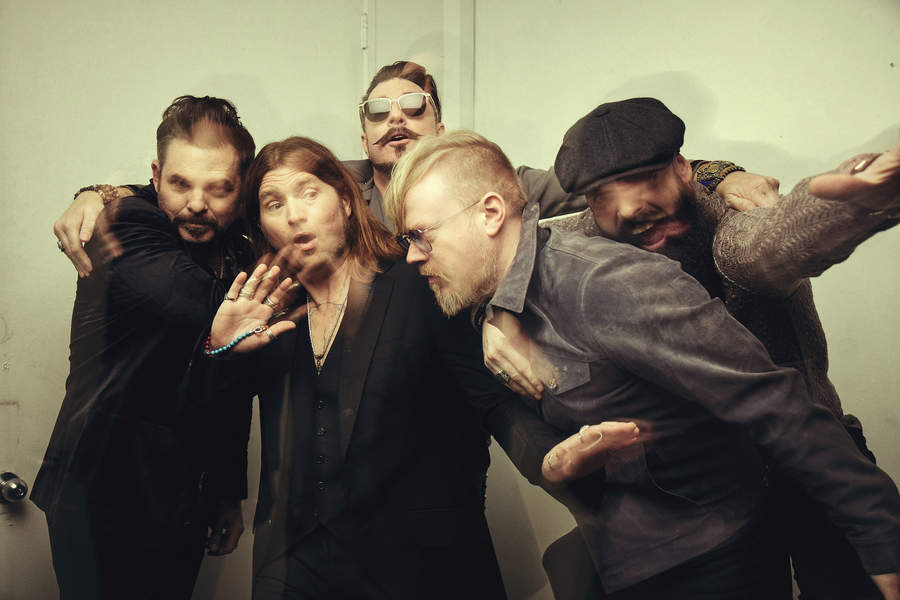
We walk around the corner to a tiny Mexican restaurant, its walls decked with sun-bleached photos of the assorted menu offerings. Scott Holiday wears sunglasses indoors. With his slicked-back hair, handlebar moustache and energised mannerisms, he looks every bit the rock star. Born and raised in Southern California, he speaks with an easy cadence, laughing loudly at times and sharing with unguarded candour.
Cruelly, it was on the eve of the covid pandemic that Rival Sons had finally hit their stride, with the prospect of bigger steps to come. “We stayed really busy after Feral Roots,” he says. “That was roughly a two-year tour cycle for us, so that was both extreme and exciting. With the Grammy nominations, our numbers all went up – our venues got bigger, it just became a bigger business for us. We got a little more notoriety and we got seen by a lot of people. It was fantastic.”
As with the rest of the music industry, covid derailed nearly all of the band’s plans, casting the men into economic peril at a time when they might otherwise have been playing arenas.
“This really, for a band like Rival Sons, became a question of how do we survive, you know?” says Holiday. “No one’s like, flying their helicopters to gigs and living with a Scrooge McDuck vault of money when we go home. We make money when we tour, and that’s how we keep our families alive and put food on the table. So when two tours were cancelled, that was a red alert.”
They could hardly have guessed that this red alert – with its cancelled tours, financial wreckage, political divisions and crippling global anxiety – would set great forces in motion for Rival Sons.
Our food arrives. It looks like these entrees were prepared for giants; Holiday’s burrito is the size of a blacksmith’s forearm. As he slathers it with an eye-watering amount of rust-coloured hot sauce, he explains that, initially, he didn’t mind the break. He even brought home a Labradoodle puppy.
“I’m a family man,” he says. “I have two kids and a lady at home, and I was like: ‘Great, I’m gonna raise this puppy and continue to raise my children and spend extra time with them, which I needed desperately. And I’m going to not rush into making a record the way we have in general, in our career. We’re gonna really explore things. And that’s what we did.”
With the cancellation of touring, many bands found themselves with endless time to write. It was an advantage that Rival Sons were only too happy to exploit. The net result was not one but two albums worth of new material.
“We had a collection of songs. It wasn’t like we wrote Tommy or The Wall, but there’s enough of a concept in there about being pulled down and about living in a divisive and confusing time politically, socially and, frankly, racially, in America. Even throughout Europe they were having their own issues; Brexit is dividing people, pitting people against each other.
"Certainly our leader at the time, if you want to call him that, was really driving people against each other. You couldn’t help but feel it. It got dark for people. So when we’re making music, it’s a reflection of these dark times. And not to be simplistic, but I think the idea of Darkfighter is just what it sounds like – it’s about fighting this divisive horribleness, this dark cloud over us. Darkfighter is: hey, you’ve gotta fight that.”
It may only be a band rehearsal, but Jay Buchanan is smartly fitted out in a khaki-coloured suit. Soft-spoken, engaging and extremely polite, he’s miles from the howling bluesman that he inhabits on stage. He looks you in the eye, often referring to you by your name, and there’s a real sense that every word is carefully chosen – not out of guardedness, but from a desire to leave no thought unformed.
We go to a back room of the studio and sit down at a table cluttered with photos autographed by the band, and he begins to tell the story of Darkfighter.
When the pandemic hit in early 2020 he was living in Nashville and celebrating the news that he and his wife were expecting another child.
“It was crazy, because so much happened in that downtime,” he remembers. “The isolation, the loss of income, people dying of the virus, an election, masks, a vaccine, the murder of George Floyd, Black Lives Matter… everything became politicised because we were in an election year. Everything. There was a line being drawn in every which way. We’re talking about lines of division running right down the kitchen table through small-town homes across the country.”
With their tour schedule erased, they fired up their creative engines. “Scott and Istarted sending songs back and forth. He was back in California and I was in Tennessee. And nobody knew what was going on. I had a little money set aside, my savings, and I just sat and burned through that over the subsequent downtime.”
Writing in isolation and exchanging ideas remotely was new territory for a band accustomed to live collaboration. Gear companies began sending new – and in some cases prototype – equipment to the band so they could write. “We worked remotely using technology in a way that we never had. We were able to get on the phone and talk about our ideas and to work remotely in a way that became more and more intuitive.”
Somewhere in the middle of it all, Buchanan decided it was time to move his family home to California. “I needed to get my family across the country in the middle of a pandemic,” he says. “We can’t fly and we can’t do any public transit, we can’t stay in hotels or eat in restaurants, so my answer was to rent an RV and stay in campgrounds and stuff. But we made it to California.”
More on that decision in a moment. But amid rising tides of chaos and uncertainty, the new material began to take shape. There was only one vision: “I knew that the gloves were going to come off,” Buchanan says.
Rival Sons have always favoured refinement over revolution, but on Darkfighter you can hear the opening strains of a new era.
“Sonically, another sharp turn has been made,” says Buchanan “We took a sharp turn on Feral Roots because we’d taken a sharp turn on Hollow Bones. With this album I feel like, in a way, the interest inherent in the genre became less and less important to me.”
This is a big statement coming from the band who launched a revolution in that very genre. And yet it’s apparent from the outset that Darkfighter marks a bold step away from the fuzzed-out squall that first put them on the map.
“Texturally, effects-wise, different tunings… right out of the gate I think you’re going to hear something different,” says Holiday. “It opens up with a song called Mirrors, in a way that we have never opened a record. On almost every record, we start with some gigantic guitar riff. This record doesn’t. We wanted to give you a nice, warm feeling where we set the stage with a big organ intro. Todd did a wonderful job with it. You immediately get that dirty riff right after that. I used a really low tuning that I rarely use – an open-D standard tuning – and an octave fuzz effect that’s barely available. So you can immediately hear different textures.”
Mirrors deals with identity, losing it and reclaiming it. It was written by Buchanan while still living in Nashville.
“I was a tourist in my own town,” he says, of his years residing in Music City. “I’m not southern, man. I could live to be one hundred and fifty years old and I will never be southern. I’m West Coast, laid-back to the fucking bone. And it took me going there and living there for that long to realise that.”
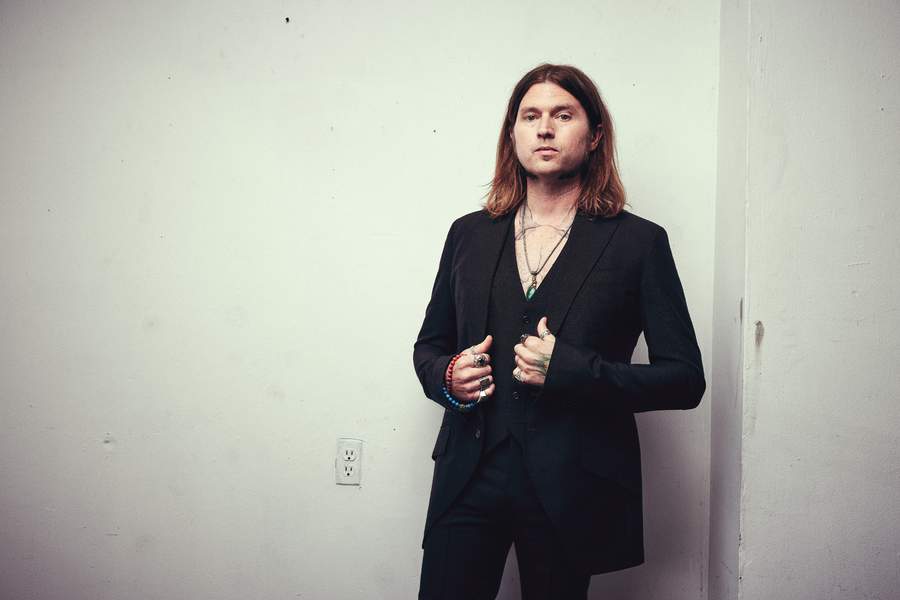
The one track that showcases the intersection where all of these new avenues merge – sonic, thematic and emotional – is Dark Side, which was inspired by news that one of Buchanan’s closest friends had succumbed to the merciless clutches of addiction.
“Dark Side sounds like the inside of a crypt,” he says. “It was written because he had kept the addiction from me and he’d kept the addiction from his family. It was a very private hell, as it usually is. But Dark Side was written in a month-and-a-half period where I had no idea where he was. That’s the lyric: ‘There are no promises to keep, now that you’ve gone to the dark side/No promises to keep any more’.
"That was one of the first songs that I brought into the band, so it was the heavy standard that we were writing to. I brought the verses and the chorus to Scott and he did a great job. That monster riff that the song opens with, that sounds like Death over your shoulder. It’s the heaviest riff that I’ve ever heard from him.”
“I listened to it in bed and it shook me,” says Holiday. “Shook me hard. I work with somebody who’s tremendously special. Like, what I’m hearing is amazing. This art is beautiful in a way that it connects with me deeply. This is a soundtrack to what’s happening, and I think there’s hope in his voice and hope in this story of despair.”
Then there’s Bird In The Hand, with its four-on-the-floor stomp, driving inexorably towards its ginormous chorus.
“Bird In The Hand is tonally different,” Holiday explains. It’s arranged differently and it feels different. Same with Bright Light. This is a different record. This isn’t Pressure & Time, this isn’t Great Western Valkyrie. It’s not that same kind of grit or that same kind of old-school rock’n’roll feel. It’s maybe a little more modern, it’s a little more progressive and, honestly, it’s a little less reliant on some of our favourite records or favourite artists.”
While diehard fans of any band tend to be resistant to change, it’s hard to imagine Rival Sons fans not being exhilarated by Darkfighter. And there are displays of the band’s established command and weight in blazing single Nobody Wants To Die and another heavy number, Guillotine.
“If you want to get heavier than Horse’s Breath, I don’t know what to tell you,” Buchanan says. “But you also have a song like Rapture. Rapture is a heavy song. It is lumbering and slow, and to me, when we play it live, with the melody and that slow, lumbering tempo, itfeels like a water bed on top of you and it just keeps getting heavier and slower.”
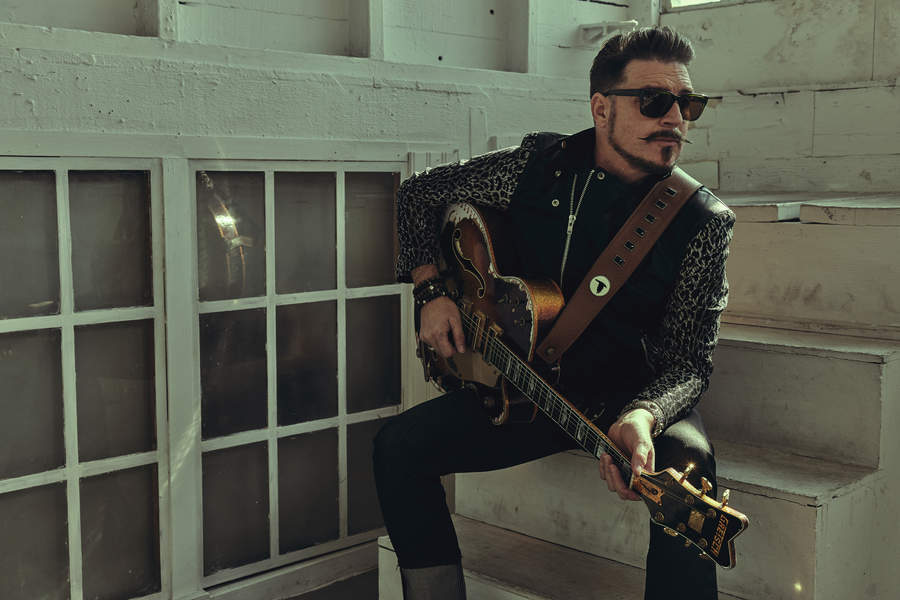
Holiday and Buchanan both express an unambiguous ambivalence regarding how Darkfighter will fare commercially. While such attitudes could suggest a bit of posturing, there’s a genuine sense that the creative process and the new songs have been so fulfilling that they’d be loath to change a single note.
“I don’t know what people are going to say, and it’s not my job to care about it,” Buchanan says. “I can’t. I do know that I’m looking forward to playing these songs live.”
Their intuition is accurate. Darkfighter might just be Rival Sons’ masterpiece. It showcases rich emotional depth and compositional maturity, not to mention a dramatic metamorphosis from the swaggering Led Zeppelin worship of their early days to the here and now, where they have conjured a modern, stridently affecting sound that is very much their own. The plan is to play the entire album live on their upcoming tour.
Some time later this year they will release Lightbringer, which opens with the track Darkfighter.
“It’s the first track on the second record, to kind of make sure it’s hitched together,” says Holiday. “It’s a big, important track to us; it’s the up-tick. You swirl down [with Dark Side], and then we have this nine-minute upturn, which is very much one of our most dramatic adventures in songwriting.”
Rather than release a double album, the band opted to leave some breathing space between the two instalments. “It started out as one album, and the collection grew too large,” Buchanan explains, “so we had to split it because the mass was going to be too large. So we needed to partition the collection for there to be a short refractory period between the two."
Following Rival Sons’ blinding, set-closing Secret, the Honda Center audience erupts in a rafter-shaking ovation. They might be tonight’s support band (bill-toppers Greta Van Fleet are up next), but cries of “Encore!” and “More!” reverberate throughout the venue.
It says something about the pull of this group. Their powerful presence, even in the face of their young headliners’ rapid rise. There’s an entire new generation of fans here who are just learning about Rival Sons – a serious upside for a band with a new album on the way.
“Those rooms were those boys’ rooms,” Holiday says of the Greta Van Fleet shows. “Honestly, these guys are so humble, and they’ve said such nice things about us. We had known before we went out that we were an influence on them. That’s the hope of hopes. You want to create something that inspires people and makes people want to create. So to hear that the people who were inspired by my work are having success, I feel elated for them.”
If anything, these new crowds have only galvanised their ambitions.
“We’ve opened for everybody,” says Buchanan, with palpable weariness. “From Black Sabbath to the Stones to Deep Purple to Aerosmith. But now I’m really starting to get the itch. I want to headline arenas. I’m tired playing theatres. We’ve played with everybody and it’s just made me hungrier.”
Both men are ready to step up to that next level. Both want to play bigger stages for bigger audiences. And with the release of Darkfighter and their rising profile, there’s every reason to believe that those ambitions could soon be realised. The rest of their year is packed with touring, press, festivals and more tours. It’s going to be an huge amount of work, but they have no intention of slowing down.
“We’ve made it this far,” says Buchanan. “God, fifteen years. So I feel like we can probably keep our shit together. I don’t know what the future’s going to be. But whatever we get we’re going to try to come by it honestly and authentically, I do know that.”
Darkfighter is out now via Parlophone. Rival Sons’ US tour begins in August, with European dates beginning in London on October 13. Dates an tickets.
Hailing from San Diego, California, Joe Daly is an award-winning music journalist with over thirty years experience. Since 2010, Joe has been a regular contributor for Metal Hammer, penning cover features, news stories, album reviews and other content. Joe also writes for Classic Rock, Bass Player, Men’s Health and Outburn magazines. He has served as Music Editor for several online outlets and he has been a contributor for SPIN, the BBC and a frequent guest on several podcasts. When he’s not serenading his neighbours with black metal, Joe enjoys playing hockey, beating on his bass and fawning over his dogs.
